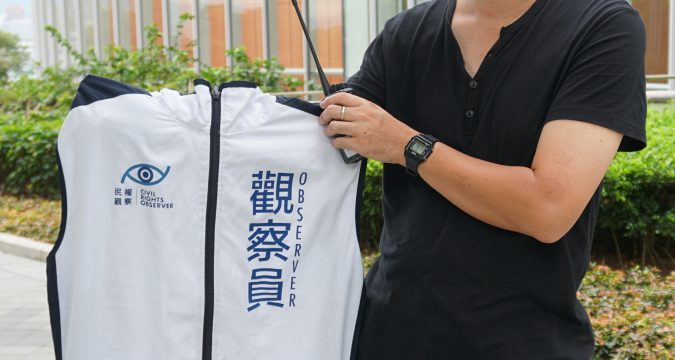
With simply one more pair of watchful eyes and one more camera, people can know more about the truth or the cause and consequence of an event. The government can be more cautious too.” said Charles Tsang Wing, a member of the Civil Rights Observer whose duty was to make records in rallies, petitions and protests to ensure that the rights of people will not be infringed.
The Civil Rights Observer was set up in 2014 after the Umbrella Movement with an aim to protect the civil and political rights in Hong Kong. It was especially concerned about the police’s abuse and power and started to send members to make records since the July 1 rally last year.
With more and more protests against the extradition bill recently, Tsang often recorded various confrontations between the police and protesters.
During an interview with the Kung Kao Po in July, Tsang recalled that he started to observe in Lung Wo Road and Tim Wa Avenue in Admiralty when a large number of protesters surrounded the Legislative Council Building against the second reading of the bill and clearly see the tactic used by the police to trap the protesters together before an attack, without considering their safety.
He recalled that around 3:30pm the police suddenly reduced its strength and only the Special Tactical Squad was on guard. He could see that protesters, believing that it is safe to proceed to Tim Wa Avenue, quickly moved forward, filling up all the space in the avenue as well as its junction at the Harcourt Road. Soon afterwards, a large number of police officers hiding in Chief Executive’s Office appeared and attacked protesters with teargas and pepper spray. “Swaying batons next to me, the police cleared Tim Wa Avenue, forcing protesters and journalists to retreat to Harcourt Road,” he said.
Tsang said after the police fired rounds of teargas, the majority of protesters raised their hands or turned their backs to the police to show that they would not charge forward. Despite that, he could see that the Special Tactical Squad kept hitting the backs of protesters with their batons.
He could also see that at the junction between Harcourt Road and Cotton Tree Drive, the police fired rounds of teargas around every ten minutes while the protesters were all peaceful. What was even more questionable was that the police fired teargas at areas where there were only journalists. “The police should stop using violence when protesters did not cause any danger. But what I can see is that the police has used violence improperly to disperse protesters and even journalists,” he said.
It was the second time Tsang suffered from the irritating smell of teargas. He remembered that he was in the protest area as the assistant of a legislator when the police used teargas against the Korean farmers while the Sixth Ministerial Conference of the World Trade Organisation was held in 2005.
Tsang said he needed three tools as an observer: a white vest helping people to identify him as an observer, a video camera and a walkie talkie. He pointed out that it is important to record every detail in protests with videos which will act as evidence if the police is accused of abusing their powers.
Tsang studied government and public administration in the Chinese University of Hong Kong in his first degree course and he later finished a degree programme in laws. Having legal knowledge, he was concerned about the abuse of power of the police, as well as their attitudes towards dissidents and unarmed people. He stressed that the police cannot enforce the law with evil intentions, as shown by incidents about the police using foul language against journalists or threatening protesters.
He said the anti-extradition bill protests were in fact supported by people of all ages, ranging from young people to even the elderlies. Moreover, social workers were often found in protest areas to act as mediators between protesters and the police.
Tsang said, as a Catholic, faith gave him comfort among the chaos. He said he felt peaceful when he heard Christians sang the hymn Sing Alleuia To the Lord in protest areas in June. He remembered he happened to have a chance to pray the rosary when he passed by a cross hang outside the Legislative Council Building in the small hours of the night, which helped him stay awake to do the monitaring work and find confidence.
Tsang believes Christians should make good use of their talents from God to pursue social justice and care about the marginalised so as to build up the kingdom of God on earth.
Furthermore, the Civil Rights Observer made a statement on September 1 expressing its concern on the police’s shooting from height from Central Government Complex in Admiralty on August 31 as the shots, even fired with less-lethal weapons, are likely to hurt the upper part of the body, thus increasing the risk of causing grievous injuries or even death. It also condemned the police for not allowing paramedics to enter the Prince Edward MTR station at once and caused a ten minute delay of first aid on September 1.
The group called on people suffered from or witnessed police violence on August 31 to approach the group.










